Distilled vs. Mineral vs. Purified: The Healthiest Water To Drink?
Mineral Water vs. Distilled Water vs. Purified Water Comparison Table
|
Distilled Water |
Mineral Water |
Purified Water |
| Does not contain minerals | Contains minerals | Depends on which type |
| 100% pure and clear of all contaminants | May contain trace contaminants | May contain trace contaminants |
| Safe to drink | It is safe to drink | Safe to drink |
Distilled Water Disadvantages
The purity of distilled water means that it is very popular. Many people are willing to pay more money for distilled water or buy a water distillation machine because of what it means. Distillation removes all contaminated water and this includes everything from chlorine to bacteria.
Distilling water can technically mean that contaminants that have a lower boiling point than water remain in the water, although this is unlikely.
Perhaps the biggest issue with distilled water is that it doesn’t discriminate between good and bad nutrients this means it leaves you with water that is completely empty.
The result is that distilling water can remove some healthy minerals that may actually be good for you like potassium and chloride. However, your body will be able to get all these important nutrients and minerals from your diet. This is why you should be eating a healthy balanced diet and not depend on your water for nutrients.
Distilled Water Advantages
Now that we’ve talked about some of the negatives of distilled water let’s talk about its positives.
It’s particularly good if you want to get rid of heavy metals as well as the metallic taste that comes with some tap water.
Distillation works really well for this because these types of substances have a higher boiling point than water.
This means that they will be left behind after the water evaporates.
- Purifying water through distillation is a natural, simple and effective process.
- The distillation process is so simple that you can do it by yourself at home (read: DIY Water Filter).
- Being 100% pure means that it is very safe for drinking. But you can also use it for other domestic activities like cooking, cleaning, laundry and washing. Especially if you suffer from hard water, which can leave horrible white limescale marks.
- You can also use distilled water if you don’t want scratch marks on metal appliances, silverware, glass cups and your car.
- Apart from domestic and for drinking, distilled water has so many uses that includes manufacturing, gardening and industrial processes.
- Another reason for using water distillation is that it’s particularly good at dealing with contaminated tap water. The water supplied by your local municipal authority can sometimes contain contaminants but distillation is able to safely and easily remove them all.
What is Distilled Water?
Distilled water is a natural process of separating water from any impurities. It typically happens when water is brought to boiling point and the purified steam water is condensed and separated as fresh drinking water.
The water that comes out of the distillation process is 100% pure and contaminant free.
How Does Distilled Water Work?
1. Impure water reaches boiling point.
2. The water evaporates once it’s at boiling point and this evaporated water is extracted and cooled down.
3. The cooled down evaporated water is now your distilled water that is completely pure.
The reason distillation works is the different boiling points of water and impurities. And the best part is that the water is what evaporates first. So long as the temperature is constant, the impurities will stay behind wile the water evaporates.
This is a very simple process that you can do your self at home. However, be super careful when dealing with all the different temperatures.
Making distilled water is sometimes dangerous and complicated. If you are interested in making your very own DIY water filter that can make distilled water then take care.
What Is Distilled Water Good For?
Distilled water has so many uses because of its guaranteed purity.
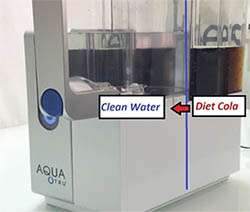 This is why water from private sources like wells will typically go through distillation.
This is why water from private sources like wells will typically go through distillation.
As a result, distilled water has so many uses that include everything from cooking, cleaning, industrial to medical and engineering.
Is Distilled Water The Healthiest Water To Drink?
If you’re looking for the purest type of water then yes, distilled is technically the healthiest water to drink.
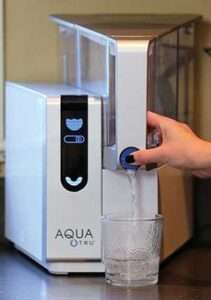 The distillation process means the water is completely empty of everything like bacteria and chemicals.
The distillation process means the water is completely empty of everything like bacteria and chemicals.
But the downside with distillation is that it removes everything from your water. And this means everything. This includes minerals and nutrients.
The result is that distilled water is also plain empty water that has nothing in it. Distilled water will hydrate you, it will be completely clean but it won’t give you any mineral nourishment.
![]()
What is Mineral Water?
As you can expect from the name, mineral water is water that is rich in minerals.
And this is why I consider it to be the healthiest water to drink. The types of minerals that comes with this depend on the brand and company that you buy it from.
![]() Sadly, there is no standard mineral ingredients list for mineral water. The mineral contents differ from brand to brand.
Sadly, there is no standard mineral ingredients list for mineral water. The mineral contents differ from brand to brand.
Mineral water is supposed to come from mineral springs (although this is not always the case).
This is unlike distilled and purified water that are made through some sort of filtration process.
Mineral water comes from natural sources and is supposed to be naturally filtered as a result. It comes from the earth’s natural water sources and it goes through different layers of the earth. It eventually ends up in different natural springs around the world.
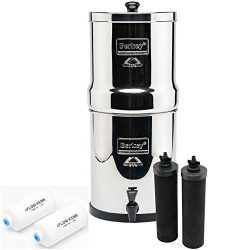 All the places that this water visits means that it picks up a lot of minerals from rocks and earth along the way.
All the places that this water visits means that it picks up a lot of minerals from rocks and earth along the way.
For instance, spring mineral water can contain substances like traces of sulphur and salt.
Depending on where the natural spring is located, you may also find traces of other minerals in your water, which can increase the water quality.
Research shows that there are some specific types of mineral ions that you can expect to find in your drinking water that come from natural sources. This includes:
- Sodium
- Magnesium
- Calcium
What Is Mineralized Water?
Mineralized water is essentially filtered water that is infused with a selection of vitamins and minerals.
The specific added nutrients are chosen by the company and therefore different from one brand to another.
Mineral water is not the same as mineralized water. This is because mineralized water is synthetic in nature i.e. man-made not from natural sources.
So be careful to always read the label as some bottling companies are not always clear.
Mineral Water Disadvantages
Of course there is no doubt that nutrients and minerals are a good thing. However, that doesn’t mean that drinking mineral water is not without its problems. Especially as mineral water should not be taken as a way to supplement a poor diet. Even the most mineral rich water can not compete with a healthy balanced diet in terms of health benefits.
There are some other disadvantages of drinking mineral water that you should also be aware of:
The types of minerals that you can find in mineral water is also bountiful in the average diet. You should not depend on mineral water to supplement your diet if you are in any way deficient in specific nutrients.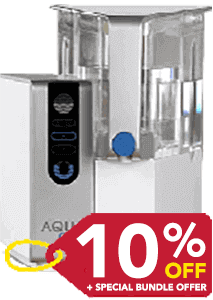
Not all mineral water is equal. Some mineral water brands are not so impressive when it comes to actual mineral content. This is why you should always read the label before you buy.
There are no regulatory standards or bodies that regulate mineral water standards so you might not always get what you pay for.
Drinking plenty of mineral water can not meet all your daily dietary needs. Yes, it can help but it does not replace what you get from a proper diet and healthy good food choices.
The biggest risk you run with mineral water is the fact that you may be getting less than what you paid for. Always read the label because some water bottle companies over-state what their water contains.
Mineral water is not 100% sterile and contaminant free like distilled water.
Mineral Water Advantages
By far the biggest advantage of drinking mineral water is the healthy mineral content that comes with it.
There are 4 key minerals that typically come with mineral water and the amount depends on the brand. The minerals you can expect are:
- Sodium
- Calcium
- Potassium
- Magnesium
These are all minerals and nutrients that your body needs and this is the reason why water companies are working hard to come up with the best mineral combination.
This is to fulfil the growing demand where people try to use mineral water to supplement a poor diet that lacks minerals.
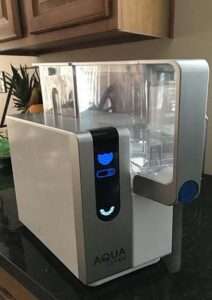 Sadly, mineral water can not fix a poor diet but mineral water does have a number of advantages that you can benefit from:
Sadly, mineral water can not fix a poor diet but mineral water does have a number of advantages that you can benefit from:
Mineral water doesn’t just hydrate your body it also enriches it with minerals and (sometimes) vitamins.
Drinking mineral water can provide you with as much as 4x the amount of minerals that’s in regular tap water – depending on the brand you choose.
You can use mineral water to add extra minerals to your diet, just make sure you read the label to make sure you’re getting the most value for your money.
Choosing the right brand of mineral water can mean you get a significantly higher amount of potassium when compared to other water sources. To really make the most out of this, ask a doctor or nutritionist to tell you which minerals your body needs the most. Then, once you have this information select a mineral water brand that is rich in the nutrients you need.
AquaTru Converts Coke Into Clean Drinking Water
What Is Mineral Water Good For?
The most obvious benefit is the healthy minerals that comes with this type of water.
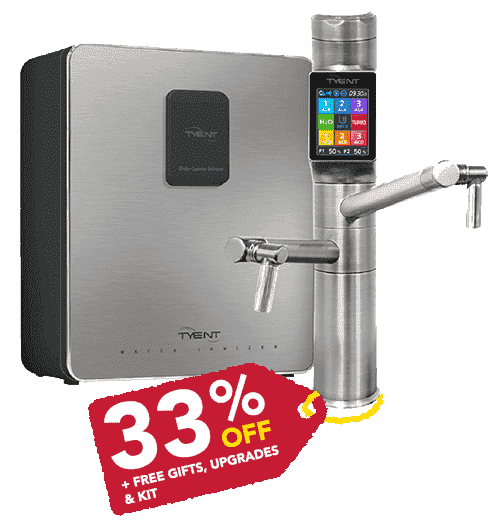 Although mineral water can not replace a healthy diet it can certainly complement the nutrients you get from the food you eat.
Although mineral water can not replace a healthy diet it can certainly complement the nutrients you get from the food you eat.
On top of that, you can also use mineral water in your beauty regimen. Mineral water has qualities that help your skin keep its healthy glow.
To use mineral water in your beauty regimen, try to drink water that includes vitamin C, K, A, E and B-complex.
 Staying well hydrated can keep up the moisture in your skin. This is a great tip for those who wear lots of heavy makeup which can wreck havoc on the moisture of your skin.
Staying well hydrated can keep up the moisture in your skin. This is a great tip for those who wear lots of heavy makeup which can wreck havoc on the moisture of your skin.
Mineral water is good for people with a low electrolyte count. Think of electrolytes as being small energy sources in your body that keep your body charged.
Having a good amount of electrolytes can help your body maintain all its regular functions.
How is Mineral Water Good For You?
When it comes to the title of “healthiest water to drink”, mineral water is slightly better than distilled water. This is so long as you carefully select the right brand that is mineral rich.
It is interesting to note that different brands of mineral water can taste better because of their mineral content.
So the bottom line is to test different mineral water brands to see which one gives you the best outcomes and value for money.
![]()
What is Purified Water?
In very simple terms (and according to its dictionary definition) purified water is water which has gone through some sort of purification process.
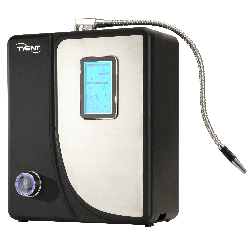 This means that distilled water is a type of purified water. The bottom line is that any type of water that has been filtered and purified in some way can be called “purified water”.
This means that distilled water is a type of purified water. The bottom line is that any type of water that has been filtered and purified in some way can be called “purified water”.
However, the big difference between “purified water” and “distilled water” is that distilled water is a very specific process.
This process results in the cleanest most sterile type of water that you can get. Purified water on the other hand, can result through any process.
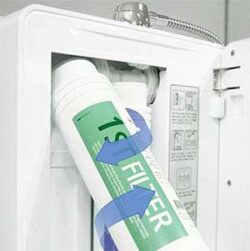 That means purified water can be almost anything as “purification” is a general description.
That means purified water can be almost anything as “purification” is a general description.
The most important thing to remember about purified water is that it’s not 100% free of all contaminants and bacteria unlike distilled water.
Simply being labeled “purified water” means that the amount of contaminants is down to a safe level for human consumption. However, the specific level of contamination depends on the type of purification process.
Purified Water Disadvantages
The biggest drawback of purified water is that you never really know what you’re getting.
If a product says “purified water”, it simply means that the water is safe to drink.
There is no guarantee of 100% purity like distilled water or high mineral content like mineral water.
Although purified water is typically free of contaminants, there is no consistency so you never actually know what you will get until you read the label.
Water purification machines can be very expensive and may need an expert plumber to install for you. There are some other expenses that can affect you like higher electricity bills.
Purified Water Advantages
The biggest advantage of purified water, as the name suggests, is that the water is clean and safe for drinking. However, there are many many other advantages with purified water that you should know about.
Purified water is free of all sorts of contaminants such as chemicals, heavy metals, pesticides and other harmful compounds.
It gives you many different options so you can choose the best one.
You can use purified water for things other than drinking like for cooking, cleaning and laundry.
It can be much cheaper to buy purified water than other types of water.
Getting purified water can be easier because it’s so generic. Especially specialist water like reverse osmosis that is pretty hard to find in super markets.
How Is Purified Water Good For You?
Purified water is very versatile when compared to mineral or distilled water. It is just as safe and contaminant free as the others.
This means that apart from being good for you, it’s also safe to give to those who are sick, elderly or even young children. But it’s not the healthiest water to drink when compared to nutrient-packed mineral water.
However, purified water stands out for its remarkable level of filtration, ensuring a high degree of cleanliness.
What is Purified Water Good For?
Purified water is good for everyone because of its high level of purity. In fact, hospitals tend to use it for things like cleaning wounds and hydrating patients.
If it’s good enough for very vulnerable patients then it is certainly safe enough for you to drink.
Which Is The Healthiest Water To Drink?
In my opinion, high quality mineral rich water is the healthiest.
However, despite all their differences, the one thing that is for certain is that all of these water types are safe to drink.
 They all meet minimum cleanliness and safety standards irrespective of whether it is distilled, purified or mineral water.
They all meet minimum cleanliness and safety standards irrespective of whether it is distilled, purified or mineral water.
Although distilled water is the cleanest and purest, mineral water has lots of nutrients.
Purified water is a good option but the issue is that it doesn’t really have a consistent out put. This is because “purification” can mean anything.
 The bottom line is that water is still water, even if the chemical composition is slightly different, the underlying fact doesn’t change.
The bottom line is that water is still water, even if the chemical composition is slightly different, the underlying fact doesn’t change.
So long as you’re drinking good safe clean water then that’s always a good thing.
Water, no matter what type it is, is still the healthiest thing to drink.
There is no such thing as a bad choice when it comes to drinking water so long as it’s clean. Any type of clean water serves the same purpose and is essential for a healthy well hydrated body.
AquaTru Water Filter | Berkey Water Filter |
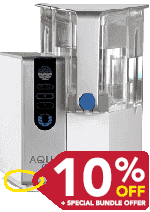 | 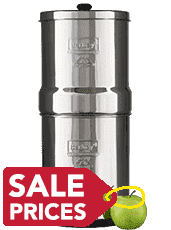 |
| - Arsenic: Approx 90% (unspecified). - Fluoride by 91.8% (WITHOUT extra filters). - Lead 97.5% - Benzene 99.9% - Chlorine 96.6% - Cysts 99.99% | - Arsenic by 99.9% (special filters required). - Fluoride by 99.9% (special filters required). - Lead 97.5% - Benzene 99.8% |
| Available in 1-size only. | Available in various sizes. |
| Plastic materials. | Metal & plastic materials. |
| Number of filters: 3 | Number of filters: 2 - 4 |
| Filter methods: Mechanical, Reverse Osmosis & Activated Carbon filters. | Filter methods: Black microporous-filters & white fluoride Filters |
| 4-stage filter process. | 2-stage filter process. |
| Holds a maximum water capacity of 3-quarts. | 2.25 Gallons |
| 45.7 x 45.7 x 38.1 cm | 19" High x 8.5" Diameter |
| System: 1 year limited warranty. | Filters: 2 years; System: 1 year. |
| Full Performance Data Sheet (AquaTru). | Berkey Contaminants List NSF/ANSI test results |
| SPECIAL OFFER? Yes, use code MRWATERGEEK  | SPECIAL OFFER? Yes, Big Berkey bundle sale |
 | |
Scientific References
Azoulay A, Garzon P, Eisenberg J. Comparison of the mineral content of tap water and bottled waters. J Gen Intern Med. 2001;16:168–75.
Drewnowski A, Rehm CD, Constant F. Water and beverage consumption among adults in the United States: cross-sectional study using data from NHANES 2005–2010. BMC Public Health. 2013 Nov 12;13:1068
World Health Organization (WHO) Fluoride. WHO; Geneva: 2011. Drinking water guidelines (4th Edition). Chemical fact sheets.
Opel A. Constructing Purity: Bottled Water and the Commodification of Nature. Journal of American Culture. 1999;22:67–76. doi: 10.1111/j.1542-734X.1999.2204_67.x
Aufderheide S, Lax D, Goldberg SJ. Gender differences in dehydration-induced mitral valve prolapse. Am Heart J. 1995;129:83–86.
Health Canada. Food and nutrition: Questions and answers on bottled waters. 2007. www.hc-sc.gc.ca/fn-an/securit/facts-faits/faqs_bottle_water-eau_embouteillee-eng.php (accessed 8 January 2018).
Raj SD. Bottled water: How safe to drink? Water Environ Res. 2005;77:3013-3018.








I’m having an issue with rashes and tiny blisters, but after reading your article I think it will be smart for me to switch to distilled water instead of purified water. Gotta do something. I’m 74 yrs old and this “aging cruise” I seem to be on is full of interesting events; LOL this seems to be one of them.
Yes, I totally agree with what you said. I also believe that one main reason why we need a water filter is because water filter will help us cleans or purify the water that we are drinking. I also believe that when we have a water filter we’re saving ourselves from a lot of costs that we can make for buying bottled water. Thanks for sharing these article.
Hey! So true. Thanks for sharing your opinion… you’re welcome to stop by here again anytime.
Best wishes,
Luke
Nice tips I’ll use if ever need. Otherwise, Mark, your Fitness workout is awesome I’m using your mostly all tips and now I’m very good and fit now after your techniques. Thanks a lot for your help and tips…
Hi Laura
Super confusing comment to be honest.
My name is not Mark and this post is not about fitness.
But thanks for stoping by and leaving a comment all the same 🙂
Have a great day,
Luke